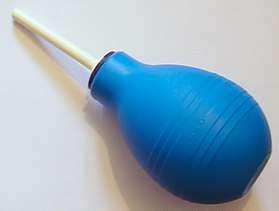Rectal douching
| Rectal douching (Rectal irrigation) | |
|---|---|
.png) This illustration of the large intestine highlights the rectum in red. A rectal douche would clean the rectum. To compare, an enema would clean further into the large intestine. | |
| Pronunciation | douche, /duːʃ/ |
| ICD-9-CM | 96.39 |
| MeSH | D007507 |
Rectal douching (also known as anal douching) is the act of rinsing the rectum with intent to clean it, typically in preparation for anal sex. An instance of this rinsing or a tool used to perform the rinse may be called a rectal douche.
Uses
Rectal douching is a hygienic practice to clean the rectum in preparation for anal sex or hydrating the rectum to void hardened stools as opposed to a pharmaceutical method to soften the stool.
Rectal douching is distinguished from anal cleansing, which is the routine cleaning of the anus after defecation, and enema, which is the rinsing of part of large intestine.
Risks
Evidence is not clear, but it is possible that rectal douching before anal sex can increase the risk of transferring HIV.[1] There is evidence that douching sometimes can disrupt the epithelium, or tissue in the rectum, and if this tissue is damaged then HIV can spread more easily.[1]
Rectal douching before anal sex increases the risk of transfer of Hepatitis B.[2]
There are reports that activities which can have the side effect of causing unintentional forcing of water into the rectum, such as waterskiing, may cause discomfort but can potentially bring other harms.[3]
Technique

Liquid, typically water, is inserted into the rectum by means of some tool. After some time, the water is expelled in the manner of a routine bowel movement, and in the process the rectum eliminates waste and becomes more clean.
Most people who use rectal douching do so with plain water.[4] The use of a hose connected to a tap, either in a shower or sink, has been reported as the most popular way to administer a douche.[4] Another popular way is with a handheld bulb and syringe designed for rectal douching.[4]
Less commonly, some people used commercial products sold for performing rectal douching, with single-use bottles of saline being most used.[4] Also commercially available but even less commonly used for rectal douching are mineral oil products intended to assist in an enema.[4]
Frequency of use
Rectal douching is a common practice among people who take a receptive role in anal sex.[4] One survey found that people are more likely to douche before anal sex if they are male, combine recreational drug use with sex, or have had a sexually transmitted infection.[4]
A 2014 study of about 5000 gay males in the United States reported that half of them had used douching at least once and most used tap water.[5] Among study participants, those who were people of color, HIV-positive people, with a sexually transmitted infection, sexually versatile, or who in their lifetime had unprotected sex with more than two partners were more likely to have recently used rectal douching.[5]
One small study of gay males included a survey in which respondents who habitually used rectal douching began doing it regularly around age 25.[1] For all demographics, the average age at which a population might start using rectal douching is older than the average age at which that population started engaging in anal sex.[4]
History
A rectal douche device was patented in 1957 in the United States by Patricia Bragg.[6]
Society and culture
From a public health perspective, understanding rectal douching practices may be important because the practice can be paired with behaviors which are risk factors to acquiring a sexually transmitted infection.[4]
Research
Research into rectal microbicide to prevent the transmission of HIV increased interest into researching safer and more gentle rectal douching techniques.[7] The hope in that research is that a rectal microbicide could be delivered with a rectal douche.[7]
References
- 1 2 3 Carballo-Diéguez, Alex; Bauermeister, José A.; Ventuneac, Ana; Dolezal, Curtis; Balan, Ivan; Remien, Robert H. (2007). "The Use of Rectal Douches among HIV-uninfected and Infected Men who Have Unprotected Receptive Anal Intercourse: Implications for Rectal Microbicides". AIDS and Behavior. 12 (6): 860–866. doi:10.1007/s10461-007-9301-0. ISSN 1090-7165. PMC 2953367.
- ↑ Schreeder, M. T.; Thompson, S. E.; Hadler, S. C.; Berquist, K. R.; Zaidi, A.; Maynard, J. E.; Ostrow, D.; Judson, F. N.; Braff, E. H.; Nylund, T.; Moore, J. N.; Gardner, P.; Doto, I. L.; Reynolds, G. (1982). "Hepatitis B in Homosexual Men: Prevalence of Infection and Factors Related to Transmission". Journal of Infectious Diseases. 146 (1): 7–15. doi:10.1093/infdis/146.1.7. ISSN 0022-1899.
- ↑ Kizer, Kenneth W. (1980). "Medical hazards of the water skiing douche". Annals of Emergency Medicine. 9 (5): 268–269. doi:10.1016/S0196-0644(80)80387-8. ISSN 0196-0644.
- 1 2 3 4 5 6 7 8 9 Javanbakht, Marjan; Stahlman, Shauna; Pickett, Jim; LeBlanc, Marc-André; Gorbach, Pamina M (2014). "Prevalence and types of rectal douches used for anal intercourse: results from an international survey". BMC Infectious Diseases. 14 (1): 95. doi:10.1186/1471-2334-14-95. ISSN 1471-2334.
- 1 2 Noor, SW; Rosser, BR (May 2014). "Enema use among men who have sex with men: a behavioral epidemiologic study with implications for HIV/STI prevention". Archives of Sexual Behavior. 43 (4): 755–69. doi:10.1007/s10508-013-0203-0. PMC 4011986. PMID 24346864.
- ↑ A US patent US2811156 A, Patricia Bragg, "Rectal douche", published 29 October 1957
- 1 2 Carballo-Diéguez, Alex; Bauermeister, José; Ventuneac, Ana; Dolezal, Curtis; Mayer, Kenneth (2009). "Why Rectal Douches May Be Acceptable Rectal-Microbicide Delivery Vehicles for Men Who Have Sex With Men". Sexually Transmitted Diseases: 1. doi:10.1097/OLQ.0b013e3181bf9b2d. ISSN 0148-5717. PMC 2891180.
External links
- Anal Sex Prep, a video explanation by Lindsey Doe which is suitable for any audience
- Douching for Bottom Boys, a video explanation targeted to gay males